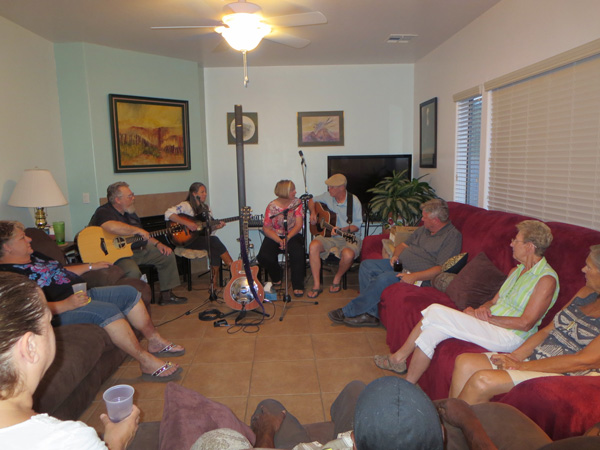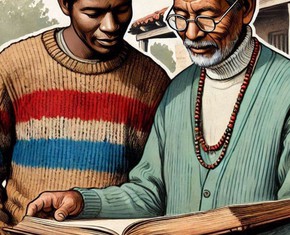The views expressed in our content reflect individual perspectives and do not represent the authoritative views of the Baha'i Faith.
In the middle of a conversation with a visitor to the Desert Rose Baha’i Institute in Arizona, she heard that the Baha’i Faith is a lay religion: no clergy, priests, ministers or rabbis; its affairs administered by democratically elected councils. After we explained the makeup and philosophy of our administrative institutions, she remarked “The world could learn a lot from you.”
Baha’is have no politics. The nine members of a Baha’i community’s administrative body, called a Local Spiritual Assembly, are elected once yearly by secret ballot, with absolutely no nominating, campaigning or discussion of who would or would not be suited to serve. Each individual strives to become acquainted with the other members of their community, get to know their strengths and weaknesses, observe their conduct, and then in a prayerful attitude quietly and privately vote for the nine people they feel best qualified to serve. Those elected have no constituency, because they have no idea who voted for them, and aren’t beholden to them in order to get re-elected.
Subjects discussed by the Spiritual Assembly are voted on only after determining the spiritual principle(s) involved in any given situation, and undergoing a process of consultation, where everyone listens to every voice respectfully, and each person’s opinion is given and considered.
Like any group of diverse people, Baha’is don’t always agree—in fact, consultation leaves them free to disagree because, as the Baha’i writings say, “The shining spark of truth cometh forth only after the clash of differing opinions.” To clash doesn’t mean to argue heatedly, and if someone just doesn’t understand a point, rather than get frustrated or annoyed with them, the others can look to this quotation for guidance:
Should any one among you be incapable of grasping a certain truth, or be striving to comprehend it, show forth, when conversing with him, a spirit of extreme kindliness and good-will. Help him to see and recognize the truth, without esteeming yourself to be, in the least, superior to him, or to be possessed of greater endowments. – Baha’u’llah, Gleanings from the Writings of Baha’u’llah, p. 8.
Because election to a Baha’i Assembly doesn’t confer any individual power on anyone, the people on that administrative body have no rank, status, or authority. They each are just another member of the community, elected to serve rather than lead. The leadership comes from the body itself, not the individuals.

Gathering at the Desert Rose Baha’i Institute
Our visitor at the Desert Rose Baha’i Institute marveled at the difference between the Baha’i way of addressing these issues, and standard governmental and political practices today. Sadly, the power struggles, corruption and win/lose dynamics of political life have increasingly become an accepted way of conducting our interactions with others in many areas of life.
I read and listen to all the concerns about bullying, in schools, in the military, in corporate America, in sports, and hear everyone speak of the need to educate against this practice. But what do children and youth see or read daily in the media? Political talk shows and newspaper columns where the other side’s beliefs are savagely attacked, rather than having someone explain in cogent terms why they disagree. And what about reality television, where backbiting, sabotage, and plain old meanness are accepted and applauded, or where contestants are humiliated in front of millions of viewers. A perverse delight seems to take hold of those watching others in these sad circumstances. It becomes an accepted social phenomena, so trying to educate against it in our daily lives will not work while we glorify it as a vicarious pastime.
During our discussion with our visitor, we spoke of the difference between being politically involved, which means being socially responsible, and being involved in partisan politics where we think we are right and the other is wrong, and we’re therefore automatically set up for divisiveness rather than consultation and cooperation.
Let us consider the wisdom of Baha’u’llah, and choose to change our TV channels when programming that promotes divisiveness appears. We can politely decline to patronize those who bully and shout down others with different opinions–unless of course we can politely and respectfully offer them our viewpoint. In our own dealings with friends, family and strangers alike, let us see God within each of them before we respond. Always, may we keep in mind this admonition from the Baha’i teachings:
Beware lest ye contend with anyone, nay rather strive to make him aware of the truth with kindly manner and most convincing exhortation. Dispute not with anyone concerning the things of this world and its affairs, for God hath abandoned them to such as have set their affection upon them. – Ibid., p. 279.
















Comments
Sign in or create an account
Continue with Googleor